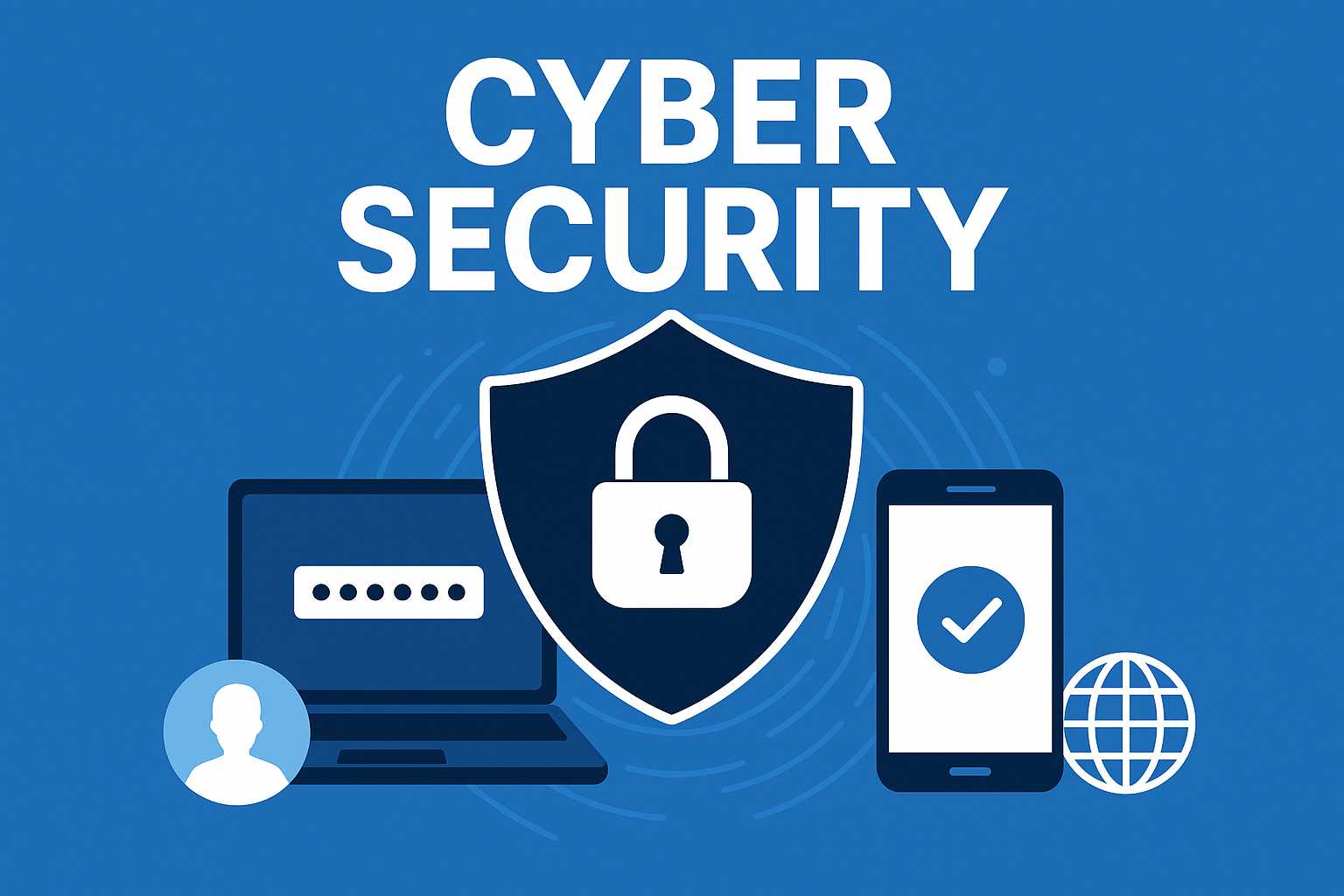Cyber Security means protecting your devices, online accounts, networks, and data from unauthorized access, hacking, malware, and digital fraud. In simple terms, it’s the lock and shield of your digital life. From online banking to shopping, social media, and remote work—everything we do is connected to the internet. Without proper protection, your personal details could end up in the wrong hands.

Remember: In the digital age, staying secure online is as important as locking your front door.
| Topic | Key Points |
|---|---|
| Definition | Protection of devices, networks, and online data |
| Importance | Personal, business, and national security |
| Major Threats | Phishing, Malware, Ransomware, Identity Theft |
| Best Practices | Strong passwords, 2FA, VPN, updates |
| U.S. Situation | FBI IC3 reports 880k+ cases in 2023 |
| Careers | Analyst, Ethical Hacker, Security Engineer |
Types of Cyber Security
- Network Security – Safeguarding your internet connections and routers.
- Application Security – Keeping apps and software secure.
- Data Security – Encrypting and protecting sensitive data.
- Cloud Security – Securing online storage (Google Drive, Dropbox, iCloud).
- Endpoint Security – Protecting laptops, smartphones, and IoT devices.
Why is Cyber Security Important?
- Protects Personal Information – Social Security numbers, bank credentials, and passwords stay safe.
- Prevents Online Fraud – Reduces chances of phishing, scams, and identity theft.
- Keeps Businesses Secure – Ensures sensitive company data doesn’t get leaked.
- National Security – Prevents attacks on government and defense systems.
- Social Media Safety – Protects from hacked accounts and impersonation.
How to Stay Safe Online (Best Practices)
- Use Strong Passwords – Mix uppercase, lowercase, numbers, and symbols.
- Enable Two-Factor Authentication (2FA) – Adds an extra login layer.
- Keep Software Updated – Install latest patches for security flaws.
- Use Antivirus & Firewall – Block threats before they spread.
- Be Careful with Public Wi-Fi – Always use a VPN when on free networks.
- Think Before Clicking – Don’t click unknown links or attachments.
- Backup Your Data – Use cloud or external drives for safety.
Common Cyber Threats in the U.S.
- Phishing: Fake emails or websites trick you into sharing login details.
- Malware: Viruses, trojans, and spyware that damage or steal data.
- Ransomware: Locks files and demands payment for release.
- Identity Theft: Criminals misuse your Social Security Number or credit card info.
- DDoS Attacks: Hackers overload websites and shut them down.
Cyber Security in the U.S.
The United States is one of the most targeted countries for cybercrime. According to FBI’s Internet Crime Complaint Center (IC3):
- Over 880,000 cybercrime complaints were filed in 2023.
- Total reported losses crossed $12.5 billion.
- Top scams included investment fraud, phishing, and ransomware.
The U.S. government has multiple agencies like CISA (Cybersecurity & Infrastructure Security Agency) and NSA working on national cyber defense. For individuals, the FTC (Federal Trade Commission) provides consumer guidance and recovery options.
Career Opportunities in Cyber Security
Cyber Security is not just about safety; it’s also a booming career in the U.S. With increasing demand, the average salary of a Cyber Security Analyst is over $100,000 per year.
Popular roles include:
- Ethical Hacker (Penetration Tester)
- Cyber Security Analyst
- Forensic Expert
- Security Engineer
- SOC Specialist
Conclusion
Cyber Security isn’t just for IT professionals—it’s for everyone who uses the internet. By practicing simple habits like creating strong passwords, enabling 2FA, and being alert against scams, you can save yourself from huge financial and personal losses.
| Homepage | Click Here |
FAQ- Cyber Security
What is Cyber Security in simple words?
Cyber Security is the practice of protecting your online accounts, data, and devices from hackers, malware, and scams.
Why is Cyber Security important in the U.S.?
Because the U.S. is one of the most targeted countries for cybercrime. Identity theft, ransomware, and online fraud cost Americans billions of dollars every year.
What are the biggest cyber threats in 2025?
Phishing, ransomware, identity theft, and AI-driven cyberattacks are considered the top threats in 2025.
How can I protect myself from hackers?
Use strong passwords, enable two-factor authentication, avoid suspicious links, keep your devices updated, and always use antivirus protection.
What is the cybercrime helpline number in the U.S.?
If you’re a victim, you can report to the FBI’s IC3 (Internet Crime Complaint Center) or call your local police department. For identity theft, contact 1-877-438-4338 (FTC Identity Theft Hotline).